Digital Poster
Infectious Diseases
ISMRM & ISMRT Annual Meeting & Exhibition • 10-15 May 2025 • Honolulu, Hawai'i

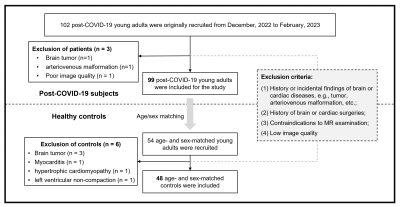 |
Computer Number: 113
3923. Prolonged
Cerebral Physiological Dysfunction in Young Adults
Post-COVID-19: Insights from a Case-Control MRI Study
J. Liu, B. Liu, X. Guo, R. Shen, S. Yu, N. Xu, Z. Lin, Z.
Ning, H. Qiao, H. Han, H. Lu, J. Zhu, W. Liang, H. Ding, X.
Zhao
Tsinghua University, Beijing, China
Impact: These findings offer critical insights into
cerebral dysfunction following COVID-19. The persistence of
impairments in cerebral blood supply and oxygen metabolism
beyond SpO2 recovery confirms long-standing damage to
fundamental brain functions and provides key pathological
evidence for long-COVID neurological manifestations.
|
|
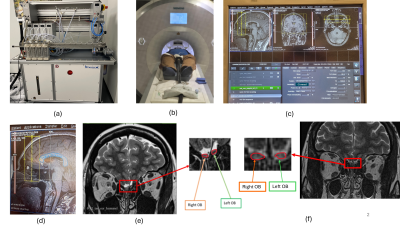 |
Computer Number: 114
3924. Olfactory
bulb volume and cerebral connectivity of post-viral (COVID-19)
smell loss patients: preliminary results of APOLLO trial
R. Sobhan, Z. Yeap, S. Bengtsson, S. Sami, T. Hummel, C.
Philpott
University of East Anglia, Norwich, United Kingdom
Impact: Interim
analysis results on baseline scans of APOLLO trial’s
olfactory disorder patients indicate their suitability to be
extended for entire cohort. This study establishes the basis
for currently ongoing APOLLO analysis.
|
|
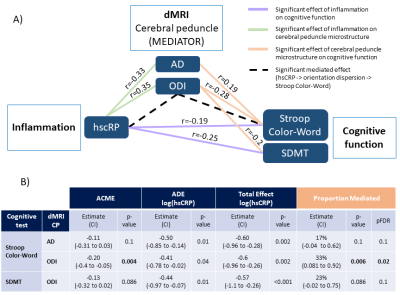 |
Computer Number: 115
3925. Neurite
orientation dispersion mediates effects of chronic inflammation
on executive function in long-COVID.
A. Silva, J. Joers, K. Byrne, L. Pollak, K. Gundry, A.
Lorente, J. Thotland, D. Deelchand, Y. Park, X. Li, G.
Manousakis, A. Metzler, C. Lenglet, L. Eberly, H. Farooq, J.
Kendall-Thomas, A. Forganian-Arani, M. Toledano, O.
Kantarci, M. Atik, M. Senjem, B. Zeydan, M. Juttukonda, D.
Salat, J. Sherman, S. Mukerji, G. Harrold, S. Yasar, M.
Nabi, S. Rehman, C. Karmonik, S. Gillani, V. Flores, R.
Davis, T. Ashizawa, P. Barker, E. Ratai, K. Kantarci, G. Öz
University of Minnesota, Minneapolis, United States
Impact: Our findings suggest SARS-CoV-2 infection may
lead to inflammatory changes in the brain, present ~2 years
after infection, which may drive cognitive deficits in
long-COVID. These findings may trigger the development of
therapeutic strategies targeting persistent inflammation
after SARS-CoV-2 infection.
|
|
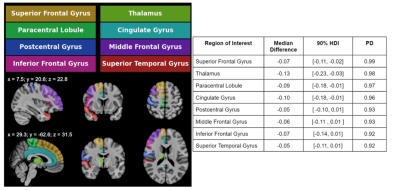 |
Computer Number: 116
3926. Impact
of Post-COVID19 Condition on Cerebral Microvasculature: a
Dynamic Susceptibility Contrast MRI Study
B. MacIntosh, S. Lin, F. O'Hara, N. Churchill, F. Tam, A.
Pavel, E. Roudaia, A. Sekuler, I. Cheng, F. Q. Gao, B. Lam,
C. Heyn, M. Masellis, J. Chen, T. Schweizer, S. Black, S.
Graham
Sunnybrook Research Institute, Toronto, Canada
Impact: Long-term reductions in rCBV occur in areas
functionally implicated in brain-related PCC symptoms, in
those not hospitalized due to COVID19. The reductions could
be causally related to PCC symptoms, or mechanisms such as
neuroinflammation, neurovascular uncoupling and injury.
|
|
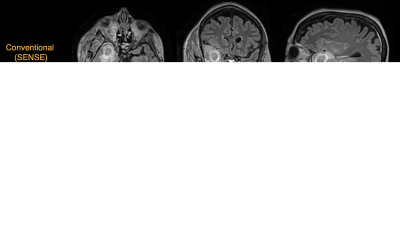 |
Computer Number: 117
3927. Initial
Clinical Evaluation of Motion-Informed Deep Learning
Reconstruction for 3D MPRAGE and FLAIR Brain MRI
S. Fujita, D. Polak, D. Nickel, D. Splitthoff, Y. Huang, C-H
Chiang, W-C Lo, B. Clifford, S. Cauley, M. Lang, J. Conklin,
S. Huang
Athinoula A. Martinos Center for Biomedical Imaging Center, Boston, United States
Impact: This initial evaluation of motion-informed DL
reconstruction on various pathologies demonstrated the
effectiveness of the technique in acutely ill patients.
|
|
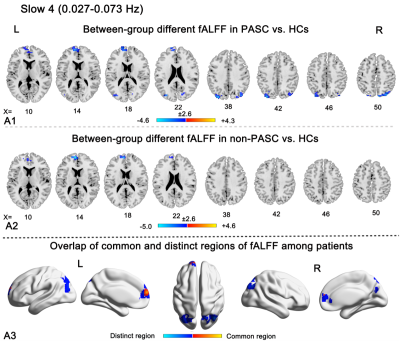 |
Computer Number: 118
3928. Frequency-dependent
activity decreases of DMN associate with depression and
cognition in patients with postacute sequelae of SARS-CoV-2
Y. Wang, J. Dai, F. Zhou
The First Affiliated Hospital of Nanchang University, Nanchang, China
Impact: Our findings may reshape the understanding of
neurological consequences of COVID-19. It would be helpful
for guiding future studies on therapeutic interventions and
enhancing diagnostic criteria for PASC.
|
|
 |
Computer Number: 119
3929. Data-driven
imaging marker for cerebral consequences of Post-Acute Sequelae
of COVID19 - prospective validation and [18F]FEPPA PET
correlation
C. Huang, J. Ying, P. Vaska, R. Parsey, C. Delorenzo, Z.
Sekendiz, A. Fontana, M. Kritikos, S. Clouston, B. Luft
Emory University School of Medicine, Atlanta, United States
Impact: The strong correlation between CoreFA and
neuroinflammatory markers from PET imaging provides a
potential biomarker for assessing PASC-related brain
changes.
|
|
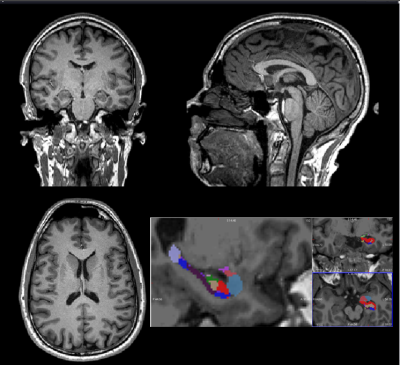 |
Computer Number: 120
3930. Hippocampal
volume alteration in patients with cognitive impairment due to
post-COVID-19 condition.
A. Dell'Orco, L. Adam, M. Steinbrenner, D. Steinbart, L.
Pechstein, C. Franke, M. Scheel
Charité Universitaetsmedizin Berlin, Berlin, Germany
Impact: Understanding the biological changes associated
with PCC advances the identification of underlying
mechanisms and could guide the development of effective
treatments for this condition.
|
|
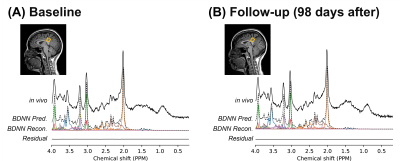 |
Computer Number: 121
3931. Longitudinal
Neurochemical Aftermath from Post-COVID Sequalae in the
Posterior Cingulate Gyrus
H. B. Yoo, H. H. Lee, Y. Seo, S. Huang, J. H. Lim
Seoul National University, Seoul, Korea, Republic of
Impact: A longitudinal assessment of neurochemical
metabolites in PCG reveals that while neuronal activity may
recover, clinical symptoms of post-COVID fatigue can
persist, potentially alongside markers of mitochondrial
dysfunction that show no improvement over time.
|
|
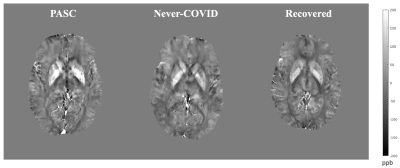 |
Computer Number: 122
3932. Long
COVID’s Lasting Impact on the Brain: Increased Magnetic
Susceptibility in Key Subcortical Gray Matter Structures
J. Ying, C. Huang, Z. Sekendiz, A. Fontana, S. Clouston, M.
Kritikos, B. Luft
Emory University School of Medicine, Atlanta, United States
Impact: The study identifies potential biomarkers for
neurological impairment in PASC patients, specifically in
the right hippocampus, caudate, and putamen. These findings
highlight potential biomarkers for PASC-related neurological
impairment, supporting targeted rehabilitation strategies.
|
|
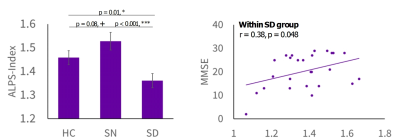 |
Computer Number: 123
3933. Assessment
of Brain Glymphatic Function in Neurosyphilis Patients Using
DTI-ALPS
J. Li, Y. Zhang, S. Li, K. Qin, R. Xie, H. Chen, E. Feng
Beijing Ditan Hospital, Capital Medical University, Beijing, China
Impact: After Treponema pallidum infection, the brain
glymphatic system plays an important role in early pathogen
clearance. DTI-ALPS can serve as an imaging biomarker to
reflect syphilis-induced damage to the brain glymphatic
system.
|
|
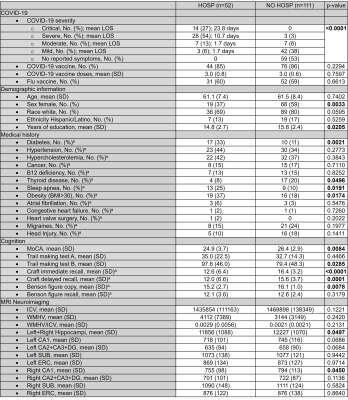 |
Computer Number: 124
3934. Examining
White Matter Hyperintensities, Hippocampal Subfields, and
Cognitive Function in Recovered COVID-19 Patients
J-J Liou, T. Santini, J. Li, M. Gireud-Goss, V. Patel, O.
Adeyemi, G. de Erausquin, V. Garbarino, M. Habes, J. Himali,
C. Karmonik, B. Snitz, J. Mettenburg, M. Wu, H. Aizenstein,
A. Marsland, P. Gianaros, F. Vahidy, T. Girard, H. Jacobs,
A. Hosseini, S. Seshadri, T. Ibrahim
University of Pittsburgh, Pittsburgh, United States
Impact: This study contributes to understanding the
neurological impact of COVID-19, revealing that hospitalized
patients experience hippocampal volume reduction and
cognitive decline. It emphasizes the utility of advanced 7T
MRI in detecting subtle brain changes, guiding future
research and clinical care.
|
|
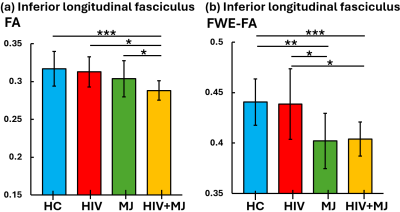 |
Computer Number: 125
3935. DTI
and DKI with Free Water Elimination Reveal Compounded
Microstructural brain abnormalities in People with HIV with
Chronic Marijuana Use
T. Salan, D. Vidot, A. Rodriguez, S. Pallikkuth, E.
Widerstrom-Noga, L. Robayo, S. Sheriff, R. Cook, V. Govind
University of Miami, Miami, United States
Impact: This study demonstrates the additive effect of
HIV infection and chronic marijuana use on white matter
microstructural integrity using multi-shell DTI and DKI with
Free-water elimination.
|
|
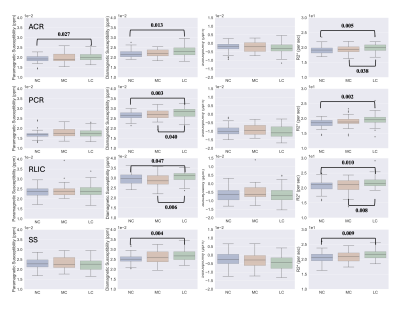 |
Computer Number: 126
3936. Assessing
Iron and Myelin Alterations in Patients with COVID-19 Using
χ-separation
M. N. Uddin, A. Faiyaz, G. Schifitto
University of Rochester, Rochester, United States
Impact: These findings may help identify biomarkers for
COVID-19 related brain involvement and guide therapeutic
approaches.
|
|
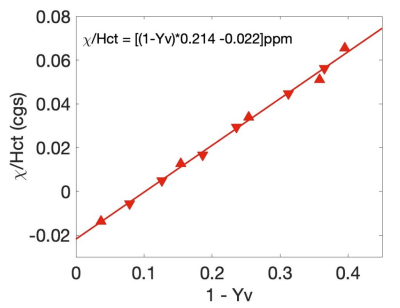 |
Computer Number: 127
3937. QSM
venography measurement of regional cerebral blood oxygenation in
PASC and ME/CFS
Z. Liu, W. Li, B. Natelson, X. Li, X. Xu
Icahn School of Medicine at Mount Sinai, New York, United States
Impact: This research reveals altered cerebral
oxygenation in PASC ME/CFS patients compared to healthy
controls, highlighting differences in oxygen extraction.
These findings support further studies on brain oxygen
metabolism in post-viral fatigue, with potential diagnostic
and therapeutic implications.
|
|
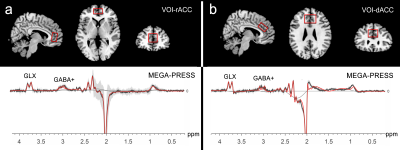 |
Computer Number: 128
3938. Altered
rostral anterior cingulate cortex GABA levels and
excitation/inhibition imbalance in post-COVID-19 patients
Y. Bi, X. Yue, F. Gao, F. Ren, X. Ma
Provincial Hospital Affiliated to Shandong First Medical University, Jinan, China
Impact: This study suggests that modulating metabolite
levels could serve as a potential therapeutic approach for
post-COVID-19 sequelae.
|
The International Society for Magnetic Resonance in Medicine is accredited by the Accreditation Council for Continuing Medical Education to provide continuing medical education for physicians.